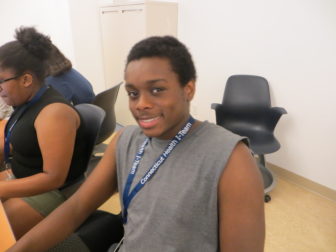While the NCAA reports that African-American men’s basketball players are graduating in greater numbers, others say more needs to be done to support the players.
The NCAA reported in 2016 that more than three quarters of Division I African-American men’s basketball players – 77 percent – earned their degrees, up five points from last year, 31 points over the past 15 years and the highest rate ever.

Tariq Sullivan
African-American male college athletes earned a graduation rate 11 percentage points higher than African-American men in the student body (52 percent to 41 percent), the NCAA report said. African-American male student-athletes have increased their graduation success rate by 19 percentage points to 70 percent during this time, the report said.
Dan Guest, a 2012 graduate of the University of Connecticut from West Hartford, was a guard on the Huskies team. He has since played basketball in Mexico and is hoping to play in Europe in August.
Guest, who is black, said he received a lot of academic support, but the support system depended on a player’s major and the player’s willingness to seek help.
“You have to be on top of your work,” he said.
Some minorities and students who are the first in their family to go to college need more support, he said.
“There needs to be more help and guidance,” he said.
Last fall, the UConn Scholars House opened as a separate dorm for African-American males when officials said more needed to be done to raise their graduation rate. At UConn, there are about 580 African-American men out of about 21,000 undergraduates on the rural campus in Storrs. Their six-year graduation rate is about 55 percent, compared to 81 percent for all male students, 78 percent for black females and 83 percent for all UConn undergraduates, the Associated Press reported in 2016.
The same year, the University of North Carolina was accused of cheating when media reports detailed black students taking classes where they had to do no work, The Huffington Post reported. They were just given good grades so that they were able to play basketball, the story said.
Nonwhite and revenue student athletes are the most likely to report that their effort toward academic work relative to their maximum potential is less than 50 percent, The Huffington Post reported. In a 2015 study of Pac-12 conference athletes, 80 percent said they’d missed a class for a game in the previous year, more than half said they didn’t have enough time to study and many said they often felt “too exhausted to study effectively,” the story said.
Desmond Conner, a sportswriter for the Hartford Courant, said the NCAA was quick to sanction UConn for poor graduation rates but has been slow to punish UNC, which he called a “blue blood in southern athletics.”
“I think the NCAA is stalling,” he said.
More universities have to support African-American athletes, he said.
“They have to make sure there are places they can go and feel safe,” Conner said.
Dom Amore, who covers the UConn men’s basketball team for the Hartford Courant, said the scandal at UNC may reach high levels.
“Somebody at the top was not doing their job,” he said.
Amore has been reporting on improvements in UConn’s Academic Progress Rate since Coach Kevin Ollie took over in 2012. Most of the players on the men’s team have graduated in the past five to six years, he said. He said UConn hired more support staff to make sure the players are doing assignments and are in classes.
The public does not always appreciate the demands on Division I athletes, he said.
“People don’t have enough respect for how hard it is to do what they have to do,” he said.
There are many support programs that boost the players’ self-esteem along with their graduation rates, Amore said. Other factors beyond support systems, such as the travel, practice and game demands on players, may result in a player not graduating, he said.
“If a student does not succeed academically, it does not mean there is not enough help,” Amore said.
Tariq Sullivan is a student at the Achievement First, Amistad Academy, New Haven.